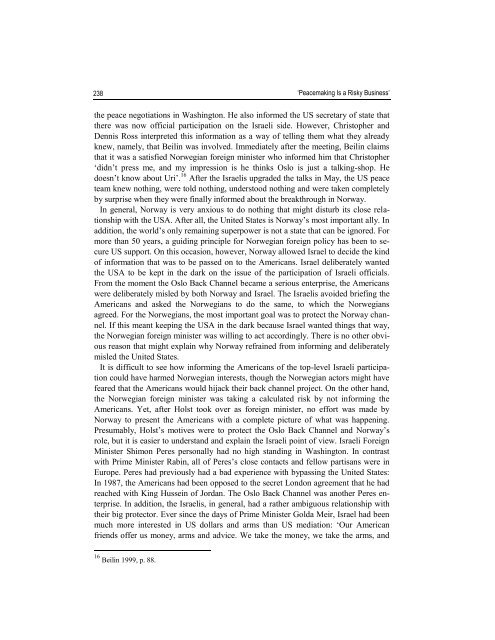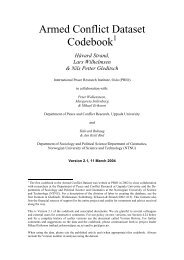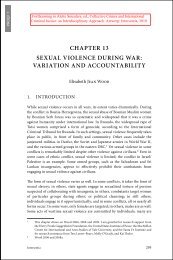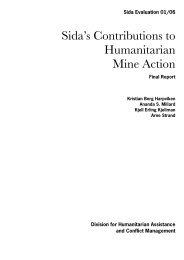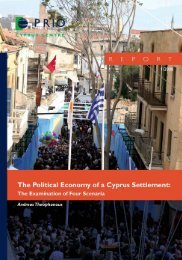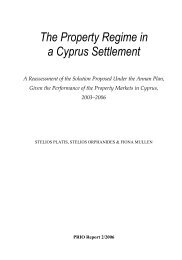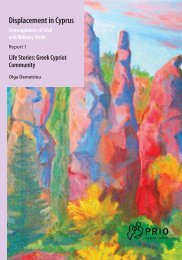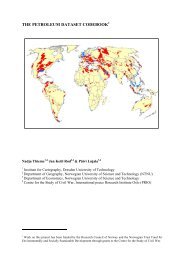Peacemaking Is a Risky Business - PRIO
Peacemaking Is a Risky Business - PRIO
Peacemaking Is a Risky Business - PRIO
You also want an ePaper? Increase the reach of your titles
YUMPU automatically turns print PDFs into web optimized ePapers that Google loves.
238 ‘<strong>Peacemaking</strong> <strong>Is</strong> a <strong>Risky</strong> <strong>Business</strong>’the peace negotiations in Washington. He also informed the US secretary of state thatthere was now official participation on the <strong>Is</strong>raeli side. However, Christopher andDennis Ross interpreted this information as a way of telling them what they alreadyknew, namely, that Beilin was involved. Immediately after the meeting, Beilin claimsthat it was a satisfied Norwegian foreign minister who informed him that Christopher‘didn’t press me, and my impression is he thinks Oslo is just a talking-shop. Hedoesn’t know about Uri’. 16 After the <strong>Is</strong>raelis upgraded the talks in May, the US peaceteam knew nothing, were told nothing, understood nothing and were taken completelyby surprise when they were finally informed about the breakthrough in Norway.In general, Norway is very anxious to do nothing that might disturb its close relationshipwith the USA. After all, the United States is Norway’s most important ally. Inaddition, the world’s only remaining superpower is not a state that can be ignored. Formore than 50 years, a guiding principle for Norwegian foreign policy has been to secureUS support. On this occasion, however, Norway allowed <strong>Is</strong>rael to decide the kindof information that was to be passed on to the Americans. <strong>Is</strong>rael deliberately wantedthe USA to be kept in the dark on the issue of the participation of <strong>Is</strong>raeli officials.From the moment the Oslo Back Channel became a serious enterprise, the Americanswere deliberately misled by both Norway and <strong>Is</strong>rael. The <strong>Is</strong>raelis avoided briefing theAmericans and asked the Norwegians to do the same, to which the Norwegiansagreed. For the Norwegians, the most important goal was to protect the Norway channel.If this meant keeping the USA in the dark because <strong>Is</strong>rael wanted things that way,the Norwegian foreign minister was willing to act accordingly. There is no other obviousreason that might explain why Norway refrained from informing and deliberatelymisled the United States.It is difficult to see how informing the Americans of the top-level <strong>Is</strong>raeli participationcould have harmed Norwegian interests, though the Norwegian actors might havefeared that the Americans would hijack their back channel project. On the other hand,the Norwegian foreign minister was taking a calculated risk by not informing theAmericans. Yet, after Holst took over as foreign minister, no effort was made byNorway to present the Americans with a complete picture of what was happening.Presumably, Holst’s motives were to protect the Oslo Back Channel and Norway’srole, but it is easier to understand and explain the <strong>Is</strong>raeli point of view. <strong>Is</strong>raeli ForeignMinister Shimon Peres personally had no high standing in Washington. In contrastwith Prime Minister Rabin, all of Peres’s close contacts and fellow partisans were inEurope. Peres had previously had a bad experience with bypassing the United States:In 1987, the Americans had been opposed to the secret London agreement that he hadreached with King Hussein of Jordan. The Oslo Back Channel was another Peres enterprise.In addition, the <strong>Is</strong>raelis, in general, had a rather ambiguous relationship withtheir big protector. Ever since the days of Prime Minister Golda Meir, <strong>Is</strong>rael had beenmuch more interested in US dollars and arms than US mediation: ‘Our Americanfriends offer us money, arms and advice. We take the money, we take the arms, and16 Beilin 1999, p. 88.


